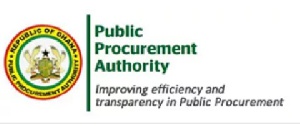Mr Frank Mante, Lecturer at the Ghana Institute of Management and Public Administration (GIMPA) and a procurement specialist has stated that the PPA must ensure that applications for single-source were justified before approving them.
“The Public Procurement Authority (PPA), which is the agency mandated to regulate public procurements, must ensure that all approvals for single-sourcing procurements meet the constitutional requirements.”
Speaking to the GNA at a Business SME Summit organised by SmartBid Ghana Limited in Accra on Wednesday, Mr Mante said the default procurement method under Ghana’s Procurement Act was the competitive tendering method, with the single-source allowed only in special cases.
These include; cases of emergency, issues of national security, compatibility with existing systems or where the supplier had proprietary rights over the products, adding that these requirements had to be adhered to.
“If it doesn’t make sense, they should just ask them to back and run a tender” he said, adding that the PPA should only grant approvals for single sourcing procurements when the reasons are convincing enough.”
While acknowledging the challenges with the single-sourcing method for procurements in the country, Mr Mante stressed the need for value for money audits to ensure that the state received the best value.
He said although value for money audits were usually conducted on major projects, it was important for institutions to also demonstrate value for money but added that the contracts must be fair and not only favour government to the detriment of the supplier.
Mr Mante who also schooled participants on how to prepare winning bids, urged participants to be detailed and ensure they fully understood the requirements of every tender before submitting their tenders.
He noted “preparing a winning bid hinged on a tenderer’s understanding of the requirements in the tender documents” and advised them to ensure that their tenders were responsive to all the requirements.
Mr Simon Annan, Co-Founder of SmartBid Ghana Limited, said the SmartBid E-procurement platform, was aimed at addressing some of the challenges in the procurement process, especially the high costs incurred in the pre-acquisition stage of the procurement process.
He said cost of advertising tenders, was a major cost component of the process which was greatly reduced or even eliminated by the use of e-procurement platforms.
The SmartBid platform, he explained, placed the bids/tenders online and alerts users via email.
The platform, he said, also helped to make the processes more transparent and allowed competition among the buyers and sellers, leading to increased savings.
He said other countries that used electronic procurement systems had been able to save. Georgia in the United States had been able to save $200million, South Korea-$1.4 million in the public sector and $6.6 million in the private sector.
He urged businesses, especially SMEs in Ghana to sign onto the platform in order to connect with buyers and sellers and grow their businesses.
Ms Stella M. Addo, Ghana Branch Chair of the Chartered Institute of Procurement and Supply urged public sector institutions especially to use E-Procurements platforms to in their procurement activities in order to make more efficient.
She said while the private sector had embraced and were using e-procurement platforms, the public sector still lagged behind in the use of e-procurement platforms, still using manual processes which were cumbersome and time and cost consuming.
She noted that it was due to a lack of awareness of the e-procurement platforms on the part of the public sector, adding that automating processes would help to boost efficiency in the public sector.
“The sector does about 70 percent of the procurements in Ghana and this will really help them” she stated, explaining that automating the processes would also reduce the time and cost involved in manual procurement processes as well as reduce fraud by cutting down on the human interface.
Business News of Thursday, 6 April 2017
Source: GNA
PPA must ensure appropriate use of single-sourcing procurement
Entertainment












